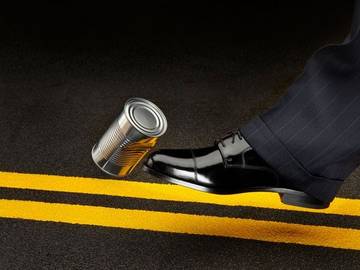Many Americans of a certain age grew up playing yard games that required no equipment at all. For the game of Kick the Can, all you needed was an old can, one player to be “It,” and a bunch of other players to hide. It’s job was to guard the can while trying to find the others; anyone who was found would be escorted to a holding area. But if a hider could kick the can before getting tagged by It, everyone went free. The game may have had its heyday in the Great Depression; by the early 1960s it had all but vanished (though its core elements live on in several other backyard games).
Then around the mid-1980s a new phrase began to be heard in the U.S. Congress. To “kick the can down the road” became, in the rhetoric of some lawmakers, a colorful and mildly critical new way of referring to putting off work on an issue for a later date.

Just put it in the recycling bin, already.
By 1988 the phrase had come to the attention of William Safire, who in his New York Times language column proclaimed the image “a superb use of metaphor. Who has not, as a kid, played kick-the-can, or in less organized fashion kicked a can or other nonbiodegradable container ahead?” For Safire the metaphor “effectively summarizes desultory but definite progress.” The phrase soon was showing up in his own prose.
But Safire’s interpretation wasn’t universally approved, especially as it became evident that the phrase hardly ever seemed to connote progress of any kind. And some standard reference books came to agree: Kicking the can down the road signifies nothing but postponement.
Edward Rowny, a senior U. S. arms control adviser, said Wednesday night the United States should work out an explicit agreement with the Soviet Union to go ahead with the Star Wars program and not "kick the can down the road."
— The World (Coos Bay, OR), 4 Feb.1988
Something was evidently gnawing at Safire as well, because fifteen years later he would return for a reconsideration. This time he conceded that the metaphor not only has little to do with the game but may not have much to do with definite progress either. Instead, it implies “just walkin' along, kickin' the can ahead, watchin' it roll, kickin' it again, until you get to your destination or just get bored, at which point you let the next guy who comes along kick it farther down the road.”
But who ever kicked a can down the road with the intent of someone else coming along and kicking it the rest of the way? And the rest of the way to where, exactly? Lacking any definitive interpretation, the rest of us were free to come up with our own: Maybe the can is a piece of trash that you play with while intending to pick it up later (thank you), or one that you toy with idly with no further intentions at all.
The average American knows what's going on, I think. And I think they know that the Congress will continue to kick this can down the road and that they've got to act.
— George Bush, Public Papers of the Presidents of the United States, 1990
Another possible scenario: You see a can discarded in the street near your house and kick it over toward your neighbor’s, thus making it his or her responsibility to pick it up (boo). Whether a piece of trash is an apt symbol for a legislative issue is, of course, a question outside our purview as a dictionary. As is the question of whether this kind of legislative postponement is simply an issue of procrastination or a deliberate avoidance of something that it’s hoped will somehow go away or fall to someone else.
By the 1980s, the name Kick the Can still lingered in many memories, but not necessarily its rules. By itself the name may have suggested to many people a cheap version of soccer—that is, a team sport in which you regularly pass off the object to someone else, thereby temporarily relinquishing your own responsibility for it.
So we’re left with a bit of a mystery, and by now accept that rational analysis will only get us so far. Literal-minded carping of this kind is naturally of little interest to the decision-makers themselves and hasn’t even slightly dented the popularity of the phrase, which has been taken up in deliberative bodies across the country. (Though the can itself must be in pretty rough shape by now.)




